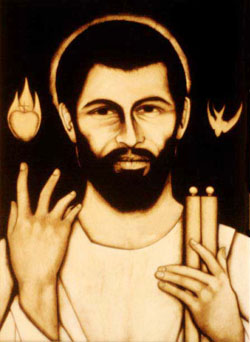 Augustine
of Hippo (354-430 AD)
was born in 345 in the town of Tagaste,
in Roman North Africa, in what is today Algeria. His mother was Monica,
a very devout Christian who had a significant influence on her son’s life.
His father, named Patricius, was a pagan of significant status in society.
Patricius became a Christian shortly before his death. Augustine
of Hippo (354-430 AD)
was born in 345 in the town of Tagaste,
in Roman North Africa, in what is today Algeria. His mother was Monica,
a very devout Christian who had a significant influence on her son’s life.
His father, named Patricius, was a pagan of significant status in society.
Patricius became a Christian shortly before his death.
Augustine was educated at
Carthage where he enjoyed academic success. He also enjoyed the party life,
and at the age of 17 fell in love with a woman whom he never named. They
lived together unmarried for 13 years and had a son whom Augustine named
Adeodatus, meaning “gift from God.” His son died in his youth.
At the age of 19, after reading
Cicero's Hortensiusat, Augustine fell in love with philosophy. He
later wrote, “It gave me different values and priorities. Suddenly every
vain hope became empty to me, and I longed for the immortality of wisdom
with an incredible ardour in my heart.” While he pursued Platonic philosophy
and the theology of the Manichaens, a Christian heretical sect, he became
restless for truth and virtue. Shortly before his 30th birthday, Augustine
encountered Ambrose, the saintly bishop of Milan. Augustine was moved by
Ambrose’s example and his inspired teaching and preaching of the gospel.
At the age of 32 Augustine found peace with God and was baptized by Ambrose
during the Easter liturgy in 387. Augustine returned to North Africa and
formed a monastic community with a group of friends. He was ordained a
priest in 391 and became a noted preacher. In 396 he reluctantly became
a bishop and remained the bishop of Hippo until his death in 430. He left
his monastic community, but continued to lead a monastic life with the
parish priests of Hippo in his episcopal residence. Augustine died on August
28, 430, during the siege of Hippo by the Vandals.
Augustine was a prolific
writer and original thinker. His numerous writings, including theological
treatises, sermons, scripture commentaries, and philosophical dialogues,
number into the hundreds. His autobiography, the Confessions, was
considerded the first Western autobiography. It was highly read among his
contemporaries and has continued as a classic throughout the ages.
Augustine is one of the most
important figures in the development of Western Christianity. He is esteemed
as a great Latin church father and a Doctor of the Roman Catholic Church.
Many Protestants consider him to be one of the theological fathers of Reformation
teaching. Among Orthodox he is called St. Augustine the Blessed. |